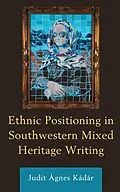Ethnic Positioning in Southwestern Mixed Heritage Writing explores how Southwestern writers and visual artists provide an opportunity to turn a stigmatized identity into a self-conscious holder of valuable assets, cultural attitudes, and memories. The problem of mixed ethno-cultural heritage is a relevant feature of North American populations, faced by millions. Narratives on blended heritage show how mixed-race authors utilize their multiple ethnic experiences, knowledge archives, and sensibilities. They explore how individuals attempt to cope with the cognitive anxiety, stigmas, and perceptions that are intertwined in their blended ethnic heritage, family and social dynamics, and the renegotiation of their ethnic identity. The Southwest is a region riddled by Eurocentric and Colonial concepts of identity, yet at the same time highly treasured in the Frontier experiences of physical mobility and mental and spiritual journeys and transformations. Judit Ágnes Kádár argues that the process of ethnic positioning is a choice made by mixed heritage people that results in renegotiated identities, leading to more complex and engaging concepts of themselves.
Autorentext
By Judit Ágnes Kádár
Klappentext
Ethnic Positioning in Southwestern Mixed Heritage Writing presents how Southwestern writers and visual artists provide an opportunity to turn a stigmatized identity into a self-conscious holder of valuable assets, cultural attitudes, and memories. The problem of mixed ethno-cultural heritage is a relevant feature of North American population, and millions face similar challenges. Narratives on blended heritage show how mixed-race authors utilize their multiple ethnic experiences, knowledge archives, and sensibilities. They explore how individuals attempt to cope with the cognitive anxiety, stigmas, and perceptions entailed by blended ethnic heritage, how family and social dynamics work, and how ethnic identity is re-negotiated. The Southwest as a region is heavily ridden by Eurocentric and Colonial concepts of identity and at the same time heavily treasured by the Frontier experiences of physical mobility along with the entailed mental and spiritual journeys and transformations. Judit Ágnes Kádár argues that the process of ethnic positioning and choice results in re-negotiated identities and more complex and engaging concepts of themselves.
Inhalt
Preface
Chapter 1: Introduction
Chapter 2 Multiracial Identity and the Southwest
2.1 "Core and Confluence": The Geo-Cultural Context of Mixedblood Writing
2.2 From "Halfbreed" to "Crossblood"
2.3 Southwestern Authors and Artists of Mixed Heritage: An Overview
Chapter 3: Identity Negotiation in Southwestern Mixedblood Poetry: A Complementary Scope
Chapter 4: "Blood Trails," Hidden Histories
4.1 The Beginning of Mixed Heritage Fictional Biographies: From Memoir to Postcolonial Storytelling
4.2 Laguna Pueblo Postcolonial Life-Writing and The Followers: Southwestern Mixed Heritage Autobiographies
Chapter 5: Multiracial Identity and its Narrative Formulation
5.1 Four Decades of Mixed-Race Writing: Altering Visions in Selected Prose Texts
5.2 A Psychological Insight into Blended Heritage Identity Construction
5.3 Cultural Identity Formulation in Multiracial Narratives
5.4 Narrative Identity: From Object to Subject
5.5 Nanabush's "Pandora's Box of Possibilities": Humor in Contemporary Multiracial Writing
Chapter 6: Some Interesting Cognitive Patterns
6.1 Grave Concerns and Nightwalkers
6.2 Sharpening Sights
6.3 "Restore me!"
6.4 "Indigenous Shapes of Water" in Mixedblood Writing
Chapter 7: Conclusion
Bibliography
8.1 Primary Sources
8.2 Secondary Sources
